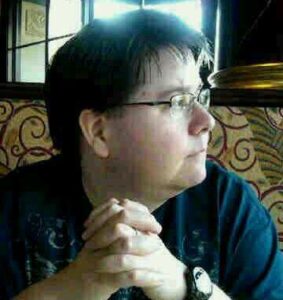Poets of the Dark: Interview with Steven Clapp
 Steven Clapp is a horror and speculative fiction author from Southern California. His past publication credits include a poem in the Horror Writers Association poetry anthology, Poetry Showcase Vol. 9 along with several short stories published in San Diego Writers Ink’s annual anthology, A Year in Ink (Vol.12-15) as well as winning San Diego Writers Ink’s Edgar Allan Poe Short Story Contest in 2018. Prior to that, his story “Freak” was published in the Australian e-zine The Mind Creative. April, 2014)
Steven Clapp is a horror and speculative fiction author from Southern California. His past publication credits include a poem in the Horror Writers Association poetry anthology, Poetry Showcase Vol. 9 along with several short stories published in San Diego Writers Ink’s annual anthology, A Year in Ink (Vol.12-15) as well as winning San Diego Writers Ink’s Edgar Allan Poe Short Story Contest in 2018. Prior to that, his story “Freak” was published in the Australian e-zine The Mind Creative. April, 2014)
What sparked your interest in horror poetry? Was there a particular event or work that inspired you to delve into the darker side of poetry?
My interest in horror poetry began a bit later in life. I read Poe growing up but not once considered writing it. It wasn’t until I reached my thirties that I took up poetry at all. Soon after, I tried horror poetry and kept writing it because it is more of a quick dive into my dark and happy place than even flash fiction. If any one event or piece was to take the blame of inspiration, it would be “The Tell-Tale Heart.” I know it’s a story, but I always felt stirred by the cadence of the narrator’s madness. That madness runs inspired a lot of my poetry.
Can you describe your creative process when writing horror poetry? Do you have any rituals or techniques that help you tap into your darkest fears and bring them to life on the page?
My writing process involves a lot of staring out of the window at trees until I slip into that other place writers go to when creating. I reach for ideas, search for feelings, and tap into memories to find a cocktail of melancholy or fear. I type up a few lines, hate them, start over with new lines, and from there begin to feel the rhythm and soul of the piece. Once done, I leave it to write other poems or prose and in a few hours or days I’ll reread all the finished works and figure out which feels right. It’s always about feeling.
How do you balance the need to be evocative and disturbing with the constraints of poetic structure and form? Are there any particular strategies you use to create tension and build suspense in your horror poems?
I guess I’m an odd duck in that I don’t write poetry in structure or form. My poetry is always a free verse mess of lines strung together. I do try to hold back the overindulgence of descriptions and slow the tempo because it’s easy to let the poem take over. When you do that you’re left with a jumbled stew of meaty metaphors drowning in a broth of nothing. As far as strategy goes, for me atmosphere is the mood setter so I usually build the scene first before injecting the madness or mayhem. I also tend to write shorter, punchier lines between longer beautiful lines which can be off-putting, breaking up comfort in reading rhythm to create tension in the reader.
Who are some of your favorite horror poetry inspirations? Are there any authors or poets whose work you admire and draw inspiration from when crafting your own dark verse?
Edgar Allen Poe was my first and greatest influence. His work taught me a love for the gothic, the terrible, and the insane. I also draw inspiration from H.P. Lovecraft, Stephen King, and Robert Mccammon and often reflect upon their darkness at times when writing. That sounds melodramatic but there are times when my darkness feels too light, too stunted, so I remember a line, a story, a poem, or an Elder God that gets me moving ahead through it all.
Finally, what advice would you give to aspiring horror poets who want to explore the genre? Are there any particular challenges or pitfalls they should be aware of, and how can they overcome them to create truly terrifying poetry?
If you’re interested in writing horror poetry, or any horror really, understand that you don’t need to read Poe or King, or anyone, to do so. Every one of us has lived through trauma, grief, or terrible times which serves as enough fuel to write horror. Horror poetry simply takes the horror we feel, we imagine, and we dream and lays it out beautifully. Find your fear, use your heartbeat as rhythm, and you can write horror poetry. The greatest pitfall anyone faces is insecurity. Thinking you aren’t good enough or as good as Poe is the number one killer of motivation. So when you’re moved to write horror poetry, forget “The Raven,” and show us your fears. That’s all. Show us your fear, in your words, and avoid cliches. As H.P. Lovecraft said, “The oldest and strongest emotion of mankind is fear, and the oldest and strongest kind of fear is fear of the unknown.” So whether it takes form as death, darkness, or uncertainty…you can’t go wrong in writing about what you don’t know.



